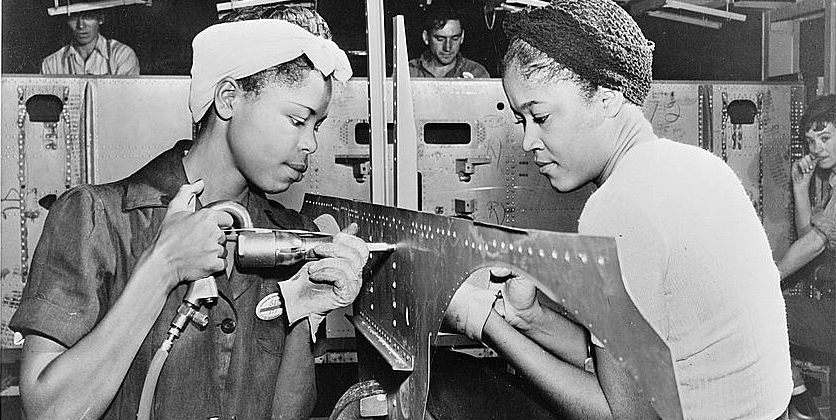In October, our group participated in a discussion on salting, industrialising, and other related strategies that have the common theme of seeking employment in particular jobs for political reasons. One of the texts was “In Defence of Working Class Existence as a Choice”, by the UK-based group Angry Workers of the World.
The Angry Workers are a collective of communists who made the strategic decision to move to a working class neighbourhood of London and take jobs in the low-wage but large-scale industries of the area. A short introduction to their project can be viewed here on LabourNet.TV’s YouTube channel.
I can’t think of any better way to put this, but how does AWW or the Let’s Get Rooted local groups recruit? Among socialists in western democracies at least — you stand out as pursuing a strategy that requires a lot more commitment than most socialists seem to be able to give. We sometimes struggle to get more than seven or eight people to come to our reading group, and all that involves is reading a couple articles and dropping by for two hours on a weeknight. You’re asking people to move to a new neighbourhood and take up a new, badly-paid job. For a lot of people, this will mean a decline in living standards, and it may mean abandoning a university degree or trade apprenticeship or a steady career. How do you do it?
You’re right, it’s rare to find people who are on an academic or any kind of ‘career’ path to take on working class jobs. But then, this isn’t really an existentialist question, but a question of political strategy. We think that the best way to engage with workers in strategic sectors is to work there yourself, but there are of course other ways. You could spend a lot of time around these industries and have long conversations with workers. You could take a better skilled job in the industry, such as engineering or administration, rather than cleaning or packing. These are options for comrades who have options. For them it will depend on the level of political enthusiasm and determination, which, in times of limited class struggles, will primarily be the result of historical and political discussions.
Then there are many worker comrades who have less options. They are stuck in low paid jobs anyway, so the question is why are they not taking on jobs in more interesting workplaces? This will mainly depend on the question of whether we can build a collective process around it: do we support those who work hard jobs by taking over some of their domestic work and organising social get-togethers? Do we support them by doing some of the research work on the sector they work in for them? Do we support them by having regular discussions about what is happening at their workplace?
The comrades we had joining us over the last six years ended up mainly being people from poorer EU countries: Poland, Slovenia, Spain. The increased job opportunities in the UK, plus the higher wages compared to their own countries, made it a more desirable location to work – at least before the Brexit effect saw the value of the pound plunging. So this fact, coupled with the fact that they already were comrades with a similar political outlook, meant that we all benefited from coming together. We all lived together and our rents were pretty low. Of the English comrades who joined us, it’s fair to say that the ones perhaps with more ‘idealistic’ leanings didn’t last long. The ones that were already working in manual jobs stayed longer. Looking back, the other main factor for ‘sticking it out’ seemed to be whether or not you had a partner. Those that did, found things easier in general.
Following on from the above question, underlying the article is a sense that the current de facto strategy of much of the left — “organise where you are” — is unsatisfactory, and that there is a need for a more targeted strategy using the limited numbers we already have. How do you identify what areas to target? How do you ensure you’re choosing the right one, instead of mistakenly choosing an industry or neighbourhood that may not exist in ten years, or may only possess a very temporary significance in the present? The “organise where you are” strategy has its limitations, but it would presumably avoid the risk of putting all your eggs in one basket.
There are different strategic aspects. With some jobs we just know that they will be of significance in future struggles and social transformation just by the fact that they are crucial for capital accumulation and/or social existence, such as health, transport, energy, food production. It will always be strategically important to work in the major industrial centres, where a lot of workers cooperate closely, such as the automobile sector.
Then there are sectors which see rapid changes, new dynamics, new workers or technologies – and it becomes of strategic importance to understand changes there. Here we could think about call centres or logistics: the sector is a result of the decomposition of industrial strongholds of the 1970s, meaning, logistics became important to connect the various geographically dispersed manufacturing units of former large industrial complexes. Over the last decades, we’ve seen that warehouses and transport hubs themselves grew massively – a large Amazon warehouse employs as many workers as a car assembly plant. We see a new type of worker, often of migrant background, often multi-skilled, though without a particular professional attachment to the job. This is perhaps a medium-term level of strategic focus.
Another level would be to focus on areas which allow us to answer specific strategic questions. One of such questions is the relation between intellectual labour (engineers, tech workers, ‘experts’) and mass manual labour today. How much do individual and collective manual workers in a given essential sector know about how their work is organised, how the product is developed, the machines are designed, the supply-chain arranged? How much do they depend on ‘intellectual workers’ and what does the relationship to them look like, e.g. do manual workers have any contact with ‘intellectual’ workers at all, are ‘intellectual workers’ also taking on management functions? Is the contact mediated through technology?
All of these questions are of importance if we want to understand how a ‘takeover of the means of production’ could look like today. The best way to find out – apart from large scale empirical research – is to get jobs at the junctions between intellectual and manual labour in large-scale industries. There are many other significant questions like that, e.g. the new composition of migrant labour, the question how energy, transport or agricultural workers relate to climate change and so on.
The main thing is to know what you find politically interesting about the job and then try to find out or work on that aspect while you’re in that job. The results -if they’re shared – will always be useful. You don’t have to stay in the same place for ten years or something! Like any job, once you feel you’ve done all you can, or you reach some kind of dead-end, you look for something else…
One of the concerns raised in the group was that your approach could result in a kind of “workerism”, where workers in certain industries like in logistics or food production are prioritised at the expense of those in sectors less obviously essential to the production process, like teachers, childcare workers, carers, sex workers, etc. Manual labourers doing ‘masculine’ work get romanticised whereas those in typically ‘feminine’ work get neglected. How would you respond to this? How do you ensure the whole class is being brought together, not just certain sections of it?
First of all, we would question that manual mass labour is ‘masculine’. Food production, warehouse work, picking, packing, cleaning, agricultural labour, hospital workers, electronics or garment manufacturing – are all jobs where a lot of women work. But you’re right, strategy is the opposite of focusing on everything. We make no bones about the fact that we think some sectors have a larger potential for mass struggle and a greater significance for social transformation than others. This is not of our choosing, but due to the way capitalism is structured. There are millions of workers whose job it is to care for other working class people – for children, the sick, the elderly – and their number might well be increasing with the average age of the population rising. And it is true that if this work isn’t done, the impact on the productive circuit would be severe.
The problem here is two-fold. If capitalism has achieved anything, it’s that it has radically minimised the time necessary for ‘social reproduction’. Domestic work, compared to its role in previous societies, actually becomes increasingly marginal – and that might not be a bad thing! The second problem is that in the current society, this care work is detached from the process of materially changing society. Out of care work you might develop the insight that human relationships need more time and space, but you are separated from the means to actually create more time and space – through lowering the amount of time it takes to produce what we need to live (clothing, housing, energy, food etc.) and to physically changing our surroundings (construction, landscape gardening, agro-planning).
We see an expression of this in the limitations of what street protests manage to actually create, e.g. in the free zones in the USA. Yes, there are food kitchens or improvised nurseries or health stations, but it remains rather haphazard, pretty time consuming, and in the end, often frustrating due to scarcity. Therefore, the actual new collective imaginations of a different society will primarily emerge out of mass struggles of those workers who deal with global transport chains, machines, productive knowledge, soil degradation etc. every day.
The charge of being ‘workerist’ is applicable in the sense that we think that waged work in ‘essential’ sectors has the greatest potential for fundamental social change. But this doesn’t mean we think other sections of the class are unimportant. The problem always seems to be that more militant sections of, let’s say, teachers, have no organic link to food workers in struggle. And without this linking up with sections of the class that actually work to meet our basic human needs, we get stuck. We think our job as revolutionaries should be to help develop these links amongst different sections of the class, but it requires all sections to be in struggle. And overall, ‘essential’ workers are ‘in struggle’ – openly at least – far less. This is why we chose to concentrate on them.
Another way we tried to bring different sections of the class together was in our solidarity network. This sought to bring people having trouble with their landlord, say, in touch with people having problems with their temp agency. This is why we got involved in local campaigns to save the libraries or build more social housing in a leisure centre redevelopment. Building a network of local working class people, that can at least effectively defend themselves was the overall aim. But this was never going to be effective purely as a bunch of ‘citizens’, which is why we always tried to make workplace links alongside the community campaigns. Only when these two can join forces can we turn a corner into offensive struggles.
Your kind of strategy used to be more common in the seventies and eighties (and earlier), when most leftist groups had some level of deliberate working class presence. For one reason or another, most of the groups and people involved in those strategies now oppose them. How do you assess this era of “industrialisation” on the left? How would you differentiate yourselves from them, and how do you ensure you won’t make the same kinds of mistakes they did?
The middle-class left always turns to the working class when workers’ are fighting and turns their back on them as soon as they are defeated. There is not much more to say about this.
In addition to your article, we also read one telling the story of a group of Kiwi Trotskyists who pursued an “industrialising” strategy in meat processing plants in the seventies and eighties, the kind of thing mentioned above. The article mentions how they attempted to introduce political causes into the workplace like the anti-apartheid movement — they invited anti-apartheid speakers to talk to workers during their lunch break, for instance. Do you attempt similar things, do you try and promote activist causes as part of your activity? Why/why not?
Sure. As communists we should of course say what we think about racism, climate change, abortion, gay rights. We should also understand that there is a significant difference between what workers think about these issues if you ask them individually and between how they relate to these issues once they are in a collective process or struggle together. We don’t think that our main task is to convince individual workers about this or that issue. Our main task is to support the collective struggle and power of workers. Only workers who feel a degree of power as workers feel that they can be welcoming to minorities.
Why should a worker who feels isolated and powerless be welcoming to new migrants who also look for jobs and housing? Why should a worker – male or female – whose main material refuge is the family, and not their class, be open towards ‘non-heteronormativity’, or even abortion rights? Why should an airport or oil worker who can barely pay next week’s rent embrace the green movement who want to close down their job? The middle-class might have the privilege to be liberal about these questions, workers in general don’t. Only in the perspective of class struggle will there be an open ear for the fact that migrant solidarity will actually increase our strength or that as workers we have the power to determine the outcome of the ‘energy transition’ in the interest of our class and future generations.
The Wildcat article mentioned in your text tells pros to piss off and that everyone can learn everything, but how do we do that practically? How do you suggest we overcome the division of labour and the division between predominantly intellectual and predominantly manual workers in practice? Especially considering that those in the former category are comparatively well-off compared to those in the latter, and so wouldn’t have the same impulse to join together in a class struggle. Engineers and production line workers practically live in different worlds, for instance.
A big question that would require more research. We’ve worked with people who had engineering degrees who worked on the minimum wage to gain ‘work experience’ in manufacturing. There are huge wage differences amongst software programmers or ‘academics’. Recent protests of tech workers at Microsoft or Google have demonstrated that there is discontent – perhaps marginal, but vocal. The discontent is an expression of feeling alienated from their own work and products, e.g. these tech-workers criticise the use of their products by the military. These are cracks and it will be mainly be down to the mass of workers in the essential sector to show to these ‘intellectual workers’ that the working class has its own creative power and that the ‘tech workers’ and their knowledge is needed not as experts who can find a technological fix, but as class brothers and sisters.
Earlier this year, the Angry Workers published a book chronicling their experiences of and reflections on the past six years of their strategy. It’s called “Class Power on Zero-Hours”, and we highly encourage you to buy it! Check out http://www.classpower.net/ to read the introduction and take a look at the reviews.
If you’re in Sydney, contact Jura Books to see if they have copies in; otherwise, you can order it by emailing them at angryworkersworld@gmail.com.
For more, check out their blog at angryworkersworld.wordpress.com, or their wider ‘Let’s Get Rooted’ project at letsgetrooted.wordpress.com. Keep up to date with them on Facebook at https://www.facebook.com/angryworkersworld/. They welcome reports on local struggles and people’s reflections on their jobs.



